ISA Table Read My Screenplay, Interviews With Winners Elaine Loh, Annika Pampel & Greg Fortier
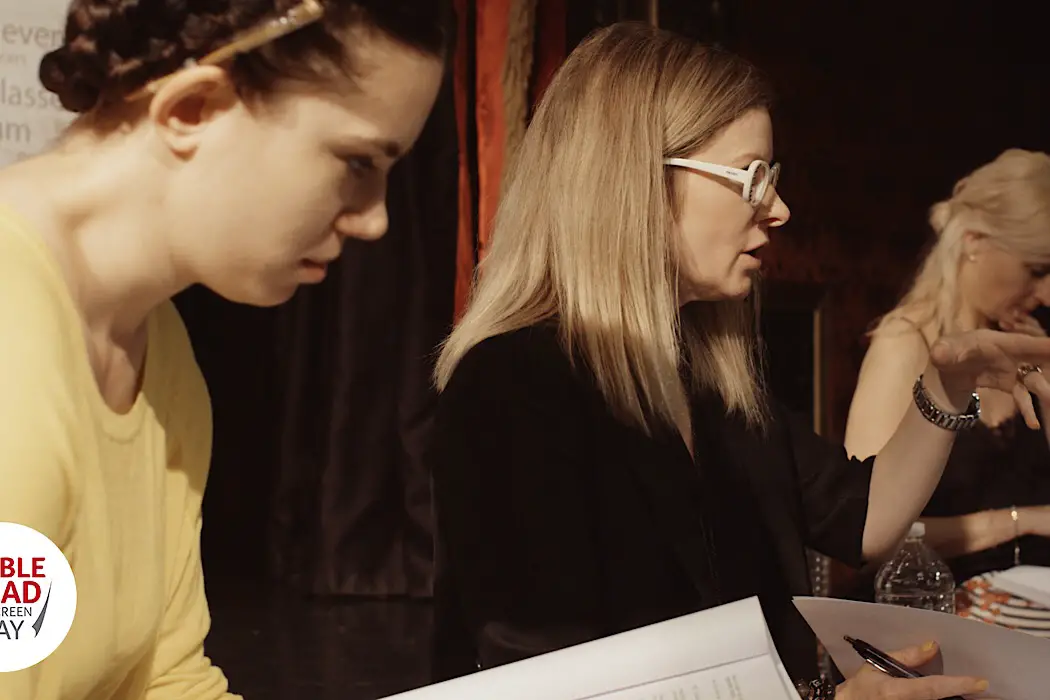
Kristy Strouse is the Owner/Editor in Chief of Film Inquiry,…
Here at Film Inquiry we love to show support for new talent, and we were able to speak with the three of the International Screenwriters Association’s impressive screenplay winners: Elaine Loh, Annika Pampel and Greg Fortier. Table Read My Screenplay is a screenplay competition that seeks to support and empower writers. They have contests that span across the USA, and in this article we’re highlighting the three winners for the Hollywood contest.
The winner of the feature/TV pilot grand prize is Elaine Loh with her script for Stringer. Annika Pampel, with her script Odium – a Requiem for Love won the ISA Hollywood Writer Award, and Greg Fortier won the grand prize for short/web series with his script Apartment Story.

Elaine Loh
Elaine Loh is a writer/director who has had films screen at Academy-qualifying festivals, along with placing in competitions including NBCUniversal/YOMYOMF’s Interpretations contest and New Filmmakers LA (winning the Audience Vote and the Grand Prize, a $60k value). Elaine has had scripts place in Final Draft Big Break (Top Ten), PAGE Awards, Austin Film Festival, Blue Cat, Scriptapalooza, and ISA’s Fast Track (Top 50) and ISA’s Table Read My Screenplay (Grand Prize winner).
On a personal note, Elaine was born in Singapore, grew up in Hong Kong and Taiwan until the age of 12, and then moved to Massachusetts. She does not speak any Chinese, has been told that she holds chopsticks incorrectly, and loves Wendy’s junior bacon cheeseburgers. Oh, to be an Asian American conundrum!
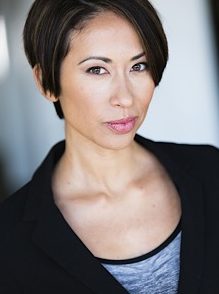
From your bio I see you’ve been involved in many contests, how did you get first get involved with Table Read My Screenplay?
Elaine Loh: I read an article a few years ago titled, “Why You Should Aim for 100 Rejections a Year” and it completely changed my perspective on my work and how I wanted to get it in front of others. Previously, I would toil for SO LONG trying to make something perfect and then I would carefully select just a handful of people I wanted to see it, waiting anxiously for their validation. Not anymore!! Don’t get me wrong, I still toil to make my writing as good as it can be, but at some point, I know I need to pull the trigger. And now I submit my writing widely, though I make sure that the contests I submit to are reputable.
Once I’ve submitted, I sit back and wait for the rejection – trying to add it to my collection! That way, if I am indeed rejected, there is no psychic pain at all. It’s what I was aiming for! But, sometimes, I end up placing highly in a contest, or even winning one (like Table Read My ScreenPlay), and that is just the best feeling. If I didn’t aim for all the rejections, I would lose out on the wins too. When I read about TRMS, it seemed like a good fit for my writing. It offered some great prizes, the submission fee was not exorbitantly high, and I knew that ISA (the International Screenwriters’ Association) was well-respected.
Can you walk us through the experience as grand prize winner?
Elaine Loh: My experience has been awesome! First, I was notified by email that I had won. Then I talked to Felicity at ISA, who told me what to expect and what my prizes would be. I filled out some paperwork (so that I could get paid and get one of my prizes shipped to me). I spoke with Emmy winner Cady McClain, who was going to direct the table read. I helped give a few suggestions for casting. I prepped to get ready for the Hollywood Pitch Festival (which was just crazy and fun and led to some great meetings). I went to a rehearsal of my script. It was the first time I had heard the lines out loud, so that was just amazing.
The actual performance could not have gone better. The actors really nailed it and I think the audience laughed and oohed in just the right places. I spent the rest of the weekend pitching the script (and others I had written) to various companies and networks. I had requests from ABC, MTV, CBS, and a few production companies and agents who wanted to read my scripts. I’ve since had meetings with some of them who liked what they read. I’m in the process of following up with some of the others. And, I’m starting to now see what happens from being on the Development Slate at ISA. The whole crew at ISA has been wonderful, so I’m eager to see where we go from here.
How would you describe Stringer for us?
Elaine Loh: Here’s my logline:
Elorie Lin is a stringer – a person who runs around in the middle of the night filming car crashes and police chases, then selling the footage to the nightly news. Instead of just shooting the news, Elorie has a bad habit of becoming it.
It’s an action drama in the vein of Ryan Murphy‘s new show, 9-1-1. There is plenty of action, but the show is driven by the interactions between the main character, Elorie, and her family.
Do you have any specific inspirations?
Elaine Loh: I am a TV-aholic. I watch all types of TV shows, from The Golden Girls reruns to The Handmaid’s Tale. I definitely gravitate towards things that have central female characters and that feature a diverse cast. I participated in #AsianAugust this past month by watching Crazy Rich Asians and John Cho‘s Searching in theaters, and I also saw the Netflix hit To All the Boys I’ve Loved Before.
I’ve honestly never seen movies about Asian Americans. I’ve seen plenty of movies about Asians – mostly period stuff like Memoirs of a Geisha or Crouching Tiger… – but rarely do people who look like me get to be human first and Asian second. Usually, it’s the reverse. We are often portrayed as the perpetual foreigner, so the slew of films that came out recently featuring Asian Americans is really something special. I hope that my work can continue to show Asians as regular human beings who face dynamic and interesting situations.
Can you take us through your process a bit, as you work through a new project?
Elaine Loh: Well, first I procrastinate. And then I procrastinate a bit more. Finally, when I am just about to hate myself, I start writing. I always need to write things down by hand first. I have a huge drawing pad that I write ideas in. I’ll also handwrite character descriptions and bits and pieces of an outline. Once I feel like I have a sense of the story I want to tell and the people who will be in it, I’ll shift to the computer and try to write a summary of the pilot (or the feature). When the summary is done, I’ll flesh it out and add particular beats. Sometimes I’ll write in lines that I know I’d like to use.
Once I feel like I have a pretty decent outline, I’ll start actually writing in script mode. I barely re-write as I go. Just get the rough draft out. The vomit draft, as some people say. Then I’ll go back and do my own pass at it. After I feel okay, I’ll send it to some trusted fellow writer friends and get their notes. I also belong to a writer’s group. After I take (or don’t take) their notes, I’ll send it to my manager, or perhaps even a professional script fixer if I feel like something is missing (I often use Doug Davidson). Then I put it out into the world and wait for my 100 rejections! 🙂
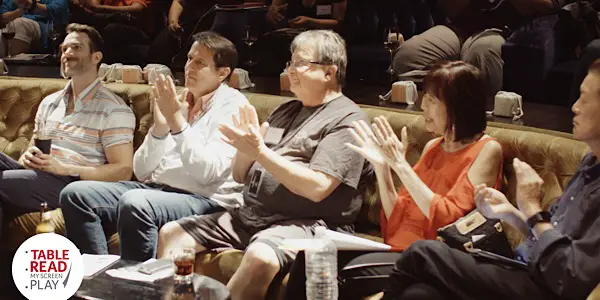
Greg Fortier
Greg Fortier was born in New York City, attended high school in Brooklyn and undergrad in Washington, DC where he majored in psychology. Creative writing evolved from a hobby to a profession after he wrote his first pilot, Today’s Special, which was crowdsourced on Kickstarter, produced in NYC, debuted at the NYTV Festival and was awarded “Best Pilot” at Hoboken International.
Since then, Greg has written four feature films and one pilot for hire, worked as a script doctor, performed as a stand-up and filled in the gaps as a bike messenger and English tutor. He currently lives in Harlem with his wife and is working on a new feature film.

How did you get involved with ISA and the contest?
Greg Fortier: After spending the past three years freelancing — writing to other people’s ideas — I decided to enter a new phase in which I put my time and creative energy behind my own projects. This meant submitting to festivals and contests as if my future as a screenwriter depended on it.
Naturally, ISA’s name was everywhere as soon as I began down this path. I was drawn to the Table Read contest because it struck that happy medium between accessibility and professionalism. The fact that it took a special interest in written, unproduced works was a bonus.
Is this your first time entering a writing contest?
Greg Fortier: Yes! All my other submissions have been to film festivals, so this is my first pure “contest.” And if it’s any indication, I have to assume I will win every contest I enter from here on out, right? Right!?
Who are your favorite writers, or favorite films that have inspired you?
Greg Fortier: I’ve never been one to pledge allegiance to specific filmmakers, but the Coen Brothers seem to be behind so many of my favorite silms. Movies such as Fargo and Inside Llewyn Davis illustrate the human condition in a such a tragic, darkly-comedic fashion that always strikes a chord with me.
Can you describe Apartment Story for us?
Greg Fortier: “Cheeseburgers for Geoffrey,” the prize-winning script and pilot for the Apartment Story web series is about a pair of unlikely roommates helping each other get unstuck from the bad places in which they’ve become mired.
In the pilot, it’s way past time for Gayle’s beloved dog to be put down. Gayle, however, has declared she won’t make the fateful move until Geoffrey has finished his bag of expensive organic dog food. David finds this appalling, but David shouldn’t even be there — his ex-girlfriend (Gayle’s ex-roommate) broke up with him weeks ago, right before she moved out. David, in denial, is squatting in her old bedroom awaiting her return. It’s not ideal.
Not only do these two misguided, mismatched roommates help each other overcome these traumas, but they begin to create something greater than themselves in their shared apartment — a home, a sanctuary, a place to work out their fatal flaws as they steel themselves to take on the world outside these walls.
For more on Apartment Story, including the script of a later episode in the web series, check out the website.
Do you have any specific writing habits, and do they differ depending on the type of project (say feature- short)?
Greg Fortier: I write early in the morning, when I am by far the most effective. I can generally only work on one project at once because, even when I’m not staring at the page, my head exists in the creative space of that project. In fact, that’s when my best ideas tend to come — away from the page, often on a walk, a bike ride, or while obsessively cleaning my apartment.
What made you want to be a writer?
Greg Fortier: The feeling I get after creating something I love on the page is unmatched in anything else I’ve endeavored to do. I also find that path to the finished product is rarely pretty but endlessly interesting.
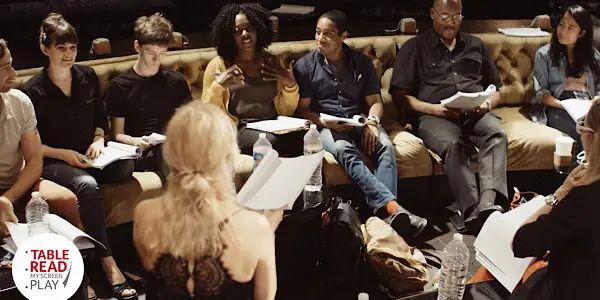
Annika Pampel
After her B.F.A. in Theater Directing, Annika Pampel received a Fulbright scholarship and a Masters in Film Directing at SCAD. She has been in Mob City, The Originals, Hindsight, NCIS New Orleans, Jungle Cruise and Counterpart. Her short Crossing Fences won the audience awards at the Short to the Point and the Sonoma International Film Festival, as well as the best drama at AMFF.
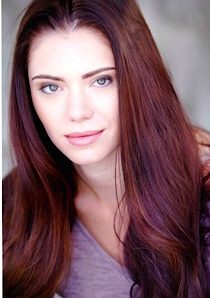
How did you get involved with ISA and the contest?
Annika Pampel: I love the Blacklist and Coverfly for beginning writers. Those are wonderful guidelines. One of them mentioned the ISA Table Read My Screenplay contest. Since I’m also a huge fan of hearing scripts out loud to tweak things, it was a no brainer to enter.
What made you want to be a writer?
Annika Pampel: Honestly? I never wanted to be a writer. I became one because I want to direct and no one just handed me a good script. It was self defense. It’s the toughest and most vulnerable part of film making to me, so I’m working on becoming a better writer every day.
You’ve written and directed a short film, Crossing Fences, previously. How do you compare the process with writing a full feature? Can you tell us a bit about the difference in your writing habits?
Annika Pampel: Crossing fences was based very closely on the adventure my grandparents had, trying to escape east Germany on a handmade boat. Writing it was a lot closer to home because I heard my grandfather’s story so many times. Of course I did additional research and structured it a bit differently, but essentially it was put into my lap since childhood. I just worked hard on staying true to his sense of humor. Odium is very different. The idea developed in order to direct a feature film. I wanted to have a piece that is interesting, very contained, character driven and almost like a play.
I love the work of Sam Shepard, so I read some of his plays again and started setting a tone. From that point I did some research on places and locations that would work with that and the most inspiring house popped up. It was made completely out of glass in an incredible environment. After seeing the house I just really wanted to play with broken characters. Glass houses and such. So my female lead is one hell of a mess in many ways. I’ve always been interested in psychology and intelligence and wanted to give each of my characters some inflictions that would be terrifying to most people. But the script shows them very slowly, so we unravel our messes with care:)
How would you describe your feature, Odium, to us?
Annika Pampel: It’s a psychological thriller. A character piece in which a couple returns to their vacation home three years after their teenage son died by suicide. His mother Mara is a criminal psychiatrist specializing in child psychopathy. She has always had dark doubts about her son, tries to uncover the mystery behind the missing neighborhood girl and whether or not her son is connected to it.
As an actress for the last ten years, being on the other side of things, is there anything you’ve learned that has helped your craft when it comes to writing?
Annika Pampel: Yes. I’ve gotten very lucky to be able to work with some great people, who were very open and loved sharing their craft. I asked so many questions, off set, but since I studied directing, it’s the control I had to let go of as a writer and as an actor. I try now to give my readers, potential actors more space in my scripts. I’ve seen some incredible performances live, and would love to be able to entice amazing actors with my work as well. They always make or break a film. So my priority is always, story, acting, shot design to help accent both. Because although I thoroughly plan and draw my shots and write pretty visually as well, space is everything and can add so much more.
Who are your favorite writers?
Annika Pampel: I love Sam Shepard and his plays. I love Aaron Sorkin, Hayao Miyazaki, Astrid Lindgren, Michael Ende, Diablo Cody and her wit and pain on the page, as well as Kubrick or the beautiful shows of Amy Sherman Palladio. Totally different pieces and I love them for very different reasons.
We want to thank Greg Fortier, Annika Pampel and Elaine Loh for speaking with us.
For more information visit the ISA Table Read My Screenplay website.
Does content like this matter to you?
Become a Member and support film journalism. Unlock access to all of Film Inquiry`s great articles. Join a community of like-minded readers who are passionate about cinema - get access to our private members Network, give back to independent filmmakers, and more.
Kristy Strouse is the Owner/Editor in Chief of Film Inquiry, writer, podcaster, and all around film and TV fanatic. She's also Head of Acquisitions at Tricoast Worldwide and is a member of The Online Association of Female Film Critics and The Hollywood Creative Alliance. She also has a horror website: Wonderfully Weird & Horrifying.













